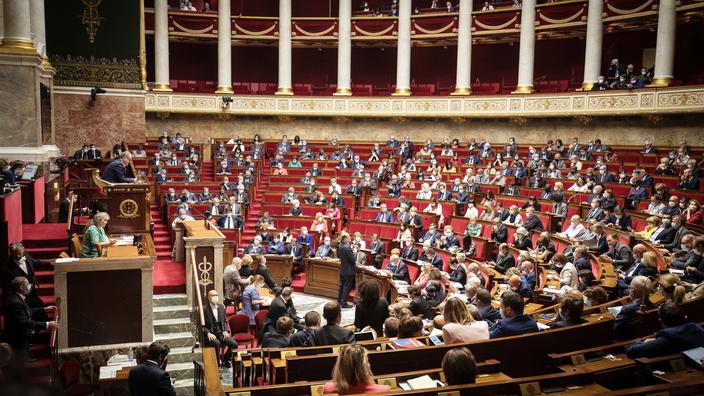3/10 Le Figaro
It started with a citizens' convention of 150 people drawn at random and risks ending with a considerable cost on employment.
The climate and resilience law includes 146 measures transformed into 69 articles and… 5,000 amendments.
Within them, 4 measures (in addition to the offense of ecocide) are particularly worrying.
Zero net artificialization for… zero net factories in the long term?
The law plans to reduce by two the rate of artificialization of soils in the next 10 years (which amounts to strongly affecting the policy of building permits) and article 48 of the text even goes so far as to mention the objective to long term of “zero net artificialization”.
The law therefore introduces the idea that it will be impossible, in the long term, to build in France, without deconstructing (and renaturalizing) in parallel.
In addition, another major constraint, the threshold forcing a commercial area or a warehouse to install renewable energy production systems or a green roof is lowered from 1,000 m2 to 500 m2.
Read the file: Macronometer: Macron's reforms scrutinized
Advertising in the viewfinder:
The issue of advertising is also addressed since an article of the project aims to limit the distribution of paper leaflets in letter boxes (by limiting the volume, or by switching to prints on recycled paper - the industry estimates that 10,000 jobs would be threatened).
Advertising for fossil fuels would also be banned in the media, on outdoor displays… but also inside “shop windows or bays of a commercial space”.
The list of products concerned must be specified by decree but it should not include cars for the moment ... even if the government has already announced that the list would be extended if the advertisers do not set, with the CSA, ambitious objectives to stop advertising of polluting products.
Still further in the regulations, the project also aims to prohibit (and condemn with a fine of 1,500 euros) small planes that advertise (mainly above beaches).
Read also: Climate law: MPs validate the ban on advertising for fossil fuels
Ban on the sale of any fossil fuel vehicle from 2040
and taxes to come.
For cars, the project confirms the objective set in 2019 of banning the sale of all fossil fuel vehicles from 2040 with a first step from 2030 when the sale of combustion cars exceeding 123 g / km of CO2 will be prohibited.
The government specifies its ambition that from January 1, 2030, sales of new passenger cars will be 95% clean cars.
And who remembers TICPE?
It is the internal consumption tax on energy products, the increase of which planned for 2019 has ignited the powders of the Yellow Vests.
The government had ended up backing down and canceling the planned increase ... but it returns to the subject by planning the abolition of the tax advantage on TICPE which "benefits from the diesel consumed by heavy goods vehicles of road transport of goods" from here. 2030. Very bad news which will continue to further penalize a very competitive sector whose tax rate is 45.2 € / hl when the European floor is 33 € / hl.
If we include VAT, France is the most taxed country (59.4 € / hl) after Belgium (61.6 € / hl), Italy (61.7 € / hl) and the United Kingdom (65.1 € / hl).
But in addition to this is added the recycling of the heavyweight ecotax which had triggered the red caps.
It could be set up by the regions but also by the departments (in order to avoid the effects of deportations) to finance the maintenance of the road network.
No domestic flight if other transport in less than 2 h 30.
While the sector is still waiting for the recovery, the bill aims, for its part, the prohibition of national links for which another means of collective transport (mainly the train) exists in less than 2h30.
Arrangements will be possible in the event of a connection, but Bordeaux-Mérignac airport already estimates that the ban on Paris-Bordeaux flights would mean losing 16% of turnover (and how many jobs for the airport, companies airline hotels?).
The text also provides for the ban on the expansion of airport facilities by expropriation… if they lead to an increase in emissions, which almost amounts to stopping any ambitious export policy in the coming years.
Read also: Can airlines be banned from their domestic flights?
Where is the costing in the impact study of the law of the jobs that will be threatened by this text?
The impact study mentions the "graphic papers" sector and its 311,000 jobs, the 400,000 jobs in the automotive sector or even the 100,000 jobs in shopping centers, but is limited to a vague formulation of the jobs created. .
"The macroeconomic assessments of the energy and ecological transition all show a net job creation effect of the order of several hundred thousand non-relocatable jobs by 2030."
While the Council of State has, rightly, issued an unfavorable opinion on the drafting of the text on the offense of ecocide, judging that the bill "
does not ensure [...] a coherent, graduated and proportionate repression of serious and lasting damage to the environment depending on the existence or not of an intention
”and underlined that many provisions of the law are“ inappropriate or even unnecessary ”(in particular the fixing of a minimum surface area dedicated to bulk sales in supermarkets ), a question becomes essential: what is the Climate law for?
This was to be the great act of decentralization of this government but, when we read the so-called 4D law for decentralization, differentiation, deconcentration and decomplexification one can only wonder where has the common sense gone and where is the “decomplexification”?
The government justifies the lack of ambition of the text by its desire not to upset the territorial functioning in the midst of a health and economic crisis.
This 4D law, if adopted, will lead each department to have different attributions from other departments, each region to have a different scope of responsibility from other regions.
This risks making management comparisons increasingly difficult, if not impossible.
Read the file: Macronometer: Macron's reforms scrutinized
It is an organic law which, adopted with the greatest indifference at the end of 2020, makes it possible to override the principle of equality and to bring us into the most total vagueness on local public management.
For example, 11,500 kilometers of national roads will see their management transferred to the departments and metropolitan areas, in particular that of Lyon, but 9,000 km of roads will be reserved for a 5-year experiment in which the regions will operate and maintain these roads.
Result: the old national roads will be managed by departments, cities or regions ...
The text does not decide on education
Blur also in health.
While two of the three vice-presidents of the future ARS Board of Directors will be local elected officials, the management of public health policy is in no way regionalized, as is the case in many countries.
That said, the law authorizes communities that wish to finance health establishments, which further confuses the cross-financing between State, local and social instead of clarifying the missions.
Read also: Galloping innovation in health attracts investors
At the level of education, it is a little the same thing, the text does not decide.
The technical agents of the colleges and high schools suffer from a double supervision, that of the school head and the community which employs them (the department for the colleges, the region for the high schools)?
To "solve" this problem, an experiment will be launched for 3 years to give the authority of instruction of the community to the deputy of the head of establishment in charge of the functions of material, financial and administration management.
And this when it would be advisable, here again, to decide that the public education policy must be managed at the level of the region.
Refocus RSA
On the social front, metropolises and urban communities will be able to create their own social action centers while those of municipalities and inter-municipal authorities are already competing with each other.
Still at the social level, an experiment to recentralize the RSA will be opened for departments in difficulty on the subject.
For these territories, the State will take over all its management from January 1, 2022.
Why not do it once and for all for all the departments and manage the distribution of RSA by Bercy rather than keeping the CAFs that take care of it in the territory?
The 4D law therefore does not escape the principle of “at the same time”.
No more skills simplification projects sacrificed on the altar of local experimentation.
Exit also the transfers of skills expected on employment, education or health.
Exit also the recentralization of the RSA which could then allow the merger of aid into a single social allowance.
There again, we will go through experiments ... Clearly, this 4D law is not a great law and not a law of decentralization at all.
It lacks panache and clarity.
Hence the score of 4/10
The Macronometer, observatory of government reforms, is a site of the iFRAP Foundation in partnership with
Le Figaro
.
This is a tool dedicated to the evaluation of Emmanuel Macron's five-year term: econometric evaluation in relation to his electoral program and the announcements of his government.
With Le Macronomètre, the government's action is rated out of 10 every Wednesday during the Council of Ministers and becomes readable at a glance.
The Macronometer allows everyone to form an opinion on whether or not the President of the Republic's promises are kept and on the effectiveness of the government's reforms.




/cloudfront-eu-central-1.images.arcpublishing.com/prisa/RFXKLPJ6S5PGXJYGTELOFX5R6E.jpg)







/cloudfront-eu-central-1.images.arcpublishing.com/prisa/KMEYMJKESBAZBE4MRBAM4TGHIQ.jpg)


